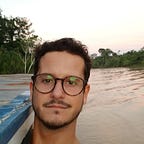And some suggestions for creating Brazil’s own future vision.
My experience at COP was somewhat unusual. I was invited to a panel at the Global Citizen Forum, in the city of Ras Al Khaimah, north of Dubai, where I stayed in a very luxurious hotel.
People took my luggage, opened the door and adjusted the chair for me to sit. It was an excess of service appreciated by the guests and participants of the event, composed of extravagant Europeans in moccasins and influencers Russians.
I was on a panel about innovation in fashion, which addressed the topic of agroecology, agroforestry and the importance of integrating family farming and traditional communities into supply chains.
As I was feeling like a fish out of water and in the middle of the desert, I felt more comfortable networking with the hotel staff. My approach was to say that I am Brazilian, as they relaxed and started to tell their story.
The social abyss.
They were people from different countries such as India, the Philippines, Uganda and Uzbekistan. But with the common desire to offer a better life for their families, who reside in their country of origin, as the United Arab Emirates (UAE) does not provide visas for family members.
Nobody said they liked being there, they didn’t feel at home, since home is where the family is. They are courageous people, from vulnerable communities and who make up 85% of the country’s working class.
Dubai and Abu Dhabi, capital of the UAE, were built with the blood and sweat of these people who, even amid allegations of exploitation and arrested activists, are made invisible. There is practically no social movement in the UAE, even though its constitution talks about the right to expression and formation of associations.
The “Emiratis”, as the locals are called, represent 15% of the population. Dressed in traditional clothes, they are always impeccable, with makeup and a beard trimmed in men’s beauty salons.
They hold government or public company positions, such as the president of COP28, Al Jaber, who led the country’s largest oil company, with the goal of being the second largest in the world by 2030.
The absurdity of this enormous conflict of interests has already been well resolved, but being the largest oil producer in the world is linked to another characteristic.
The masculine archetype.
In some moments, getting to know Dubai, I imagined the personality of someone who seeks attention, who was bullied during their childhood, creating points of fixation on wanting to show power.
The symbol of the city is the Burj Khalifa, the tallest building in the world, a large phallic object surrounded by fountains that adorn Instagram photos.
The islands are another demonstration by the Emirates, dissatisfied with the size of their coastline, they asked themselves how they could increase the number of beaches by 10 times.
Another very masculine intention is to control the ecosystem, from introducing exotic birds to literally making it rain. However, as the city is not adapted for rain, vulnerable regions suffer from flooding and damage.
Lastly, but emblematically, we intended to make the biggest ferris wheel in the world, the object is so big and heavy that it doesn’t work, an error that was never reinforced and the story remains silenced.
Rationality and strategy.
In the UAE pavilion at the COP, there is a phrase said by royalty in 2015: “Fifty years from now, we will celebrate the last barrel of oil… If we invest in the right sectors today, I can tell you, we will celebrate then”.
The country has a strategy of creating a new economic sector every three years and, in fact, tourism, construction and financial services have increased their participation, but oil still leads GDP and they continue to drink this milk.
To do this, they invest in technology, such as Carbon Capture and Storage (CCS), and the “unabated fossil fuels” narrative. In other words, the scenario where everything would be well extracted from oil as long as it captures emissions.
But it is undeniable that the EAU has done something incredible. Dubai is cleaner, more organized, safer and has more incredible developments than many large American cities.
All of this with strategic thinking, defining a long-term vision and executing with determination, without pity for whoever is in front.
What we can learn.
Brazil sometimes seems the opposite, every four years we change our vision of the future. We are ashamed of the past, we destroy what was built and we focus on rhetorical discussions.
And, even in one year of office, by joining OPEC+, moving forward with oil auctions and the time frame, we have the capacity to weaken a possible strategy of protagonism in solving the climate emergency.
The focus of our fight should not be investing in or ending fossil fuels. Even though Brazilian oil production surpassed that of the UAE in September this year.
Activism is important, but I suggest using the Emiratis for inspiration and strengthening our strategy and evolution of other economic sectors, such as Nature-Based Solutions, bringing investment and exporting solutions.
Suggestion for a future vision.
We have the greatest differentiator and technology in the world, the forest, which brings with it the values that the world needs, inspired by the feminine.
The Brazilian COP30 must give protagonism to social movements and traditional communities. Elevate the concepts of interrelationality, collaboration, care and affection. A feminine future.
With a narrative focused on climate justice, emphasizing that the root of the environmental problem is not solved only with technology, but with equality and social development.
We must display our nature, with the ability to make meaningful projects viable, empowering people and leaving no one behind.
